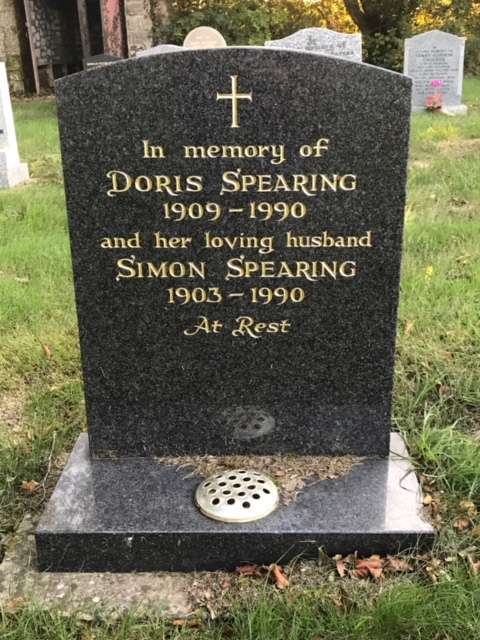
It seemed odd to think that Mrs Spearing had only been born in 1909, that meant she was only fifty-eight when we moved to the village in 1967, the age that I am this year. Mr & Mrs Spearing always seemed a venerable age, they seemed to be people who had always been at the heart of the commercial life of the village
The day began with the visit of the milkman who was called “Nipper” Knowles, I never knew his real name. He called six, if not seven, days of the week; the rattling of the crates of gold and silver topped milk bottles from Cricket Malherbie Dairies announced his progress along the road. By mid-morning Alan White, a newsagent from Langport, three miles from our village, called with that day’s paper. Den Legg, who drove the bakery van from Maisey’s of Othery, called three times a week with fresh baked bread; loaves that came with thick crusts and which were cut in thick slices with a breadsaw. On a Monday, David Macey’s mobile shop came from Curry Rivel at teatime; there were neighbours who would have bought shopping, but for children the attraction was the selection of sweets he carried. On a Monday evening Mr Bryant, the hardware merchant from Somerton did a round; we bought paraffin for the heaters from him, though he presumably carried a stock of other items. On a Friday lunchtime, there was a fishmonger who had a regular business in those days when people still ate fish. By Friday teatime, there was the sound of the Reema ice cream van from Yeovil, though he never seemed to get the level of custom enjoyed by the Wall’s ice cream van that came down the road on a Sunday teatime – Wall’s ice cream brought with it the sinking feeling that there would be school in the morning.
Then along with the travelling merchants, there was Spearing’s, where you went to the counter and asked for those things that you wanted, and, around the corner, there was the post office, where Miss Hunt at one time kept sweets and lemonade, as well as stamps and postal orders.
There were the informal merchants as well, Cliff who called on a Saturday with vegetables; Harry, who sold vegetables along with scrumpy; and various other people at various times.
The supermarket changed the entire rural economy, but let’s not pretend it was anyone but ourselves that made it possible. Like the people who complain at the closure of railways, when they drive their cars everywhere, the triumph of the supermarket over local businesses was a matter of popular choice. If the Spearings were the last people to keep a village shop, it was because we decided that would be so.


Thank you Ian, for reminding me of the grinding deprivation of my ‘inside her-Rosie’ childhood in Ruralshire. Seems hard to imagine that world now, of only being able to shop from 9:30 until 17:30, with a half day Wednesday and Saturday and with Sunday being the Sabbath. The terrors of the village shop only stocking white bread and with cigarettes on OPEN DISPLAY..twas like living in a war zone….not that we could afford bread from the shop, Mother made her own or rather I did cos Mother constantly forgot to put salt in the dough. And my Ol’ Dad had to ration himself to a couple of roll ups a day otherwise the budget for the week was shot. Dear God we had to walk all the way across the village green to buy a stamp or to post a letter.
But yes, you are right ‘we decided that would be so’.
It began slowly in approx ’61 with the first “supermarket” opening in the “big town”, 3 miles from our little village. At first this was viewed with much suspicion and its sales grew slowly. The individual shops, particularly bakers, grocers & greengrocers, saw little initial threat to their businesses, as they were sure the services they offered would soon see off this upstart intruder. “Why would Mrs x & Lady y wish to select and pick up their items when we gather and pack it all for them?”
From such small beginnings grew the (now out of town) monsters we all use today.
(It was a Tesco, approx 300 square feet, narrow aisles and very limited choices.)
It was late night opening that brought my first encounter with a supermarket. Once a week, I think it was Lipton’s in Yeovil that opened until 8 pm. It allowed time for my Dad to get home from work and us all to get in the car to go shopping.